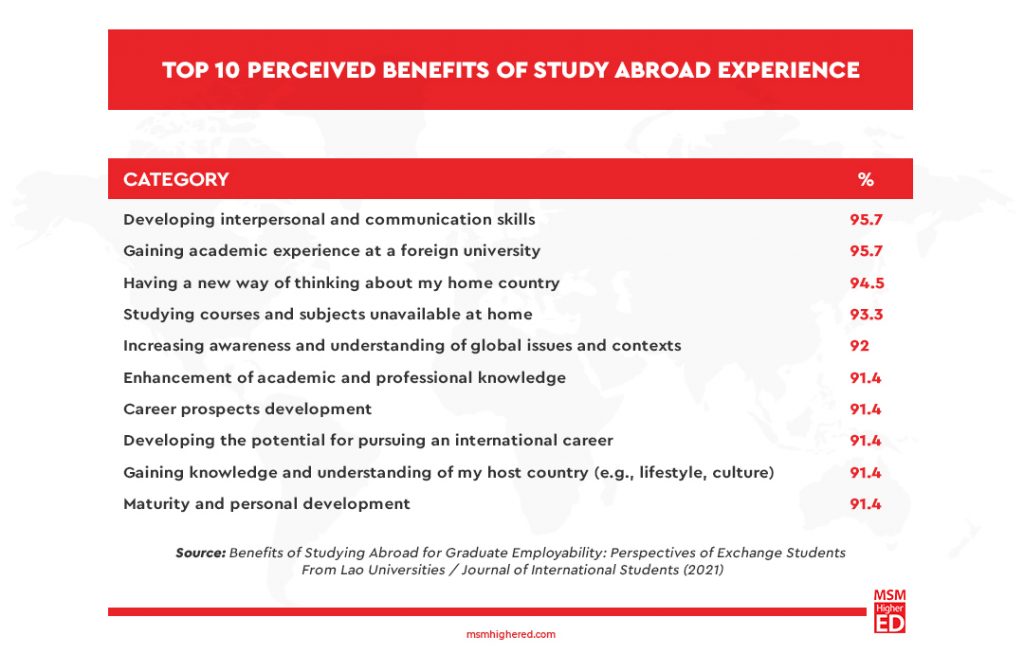
Recent years have shown the international higher education sector growing tremendously. In effect, countries are competing to attract the students with promise. However, what higher education institutions (HEIs) offer and what international students are looking for may need reassessment or re-alignment, especially in the context of international student experience and employability.
Key Points at a Glance
- In the past years, higher education institutions in different countries have been competing to attract the “best” students.
- Employability ranks as one of the top reasons why students choose to study abroad.
- Employers highly value a student’s “transversal skills.”
- Traditional or online campuses should be equipped to support students when it comes to helping them navigate the path from education to career.
While subjects of internationalization and marketing have provided researchers with a great amount of information throughout the years, the subject of employability remains to be an understudied one.
Is it easy for international students to get employment? Unfortunately, experts from both previously linked studies (2017, 2021) agree that the subject of international student employability factors still needs more research.
Employability: Top Reason of International Students
Employability ranks as one of the top reasons why students choose to study abroad.
In a recent study with international students as respondents, the top perceived benefits of study abroad experience included the “development of employability skills, enrichment of academic knowledge and experience, improvement of international competence, and forming global citizenship.”
While all of these may not be related to the technical knowledge in line with international students’ jobs, these skills relate and impact international student employability factors very much—as discussed later on in this article.

What Do Employers Look For?
Besides what is already expected of college or university graduates, employers value a student’s “transversal skills” highly.
According to an Erasmus study, 92 percent of employers look for these skills when hiring graduates. The study defines transversal skills as “qualities such as being open to and curious about new challenges; confidence; the ability to problem-solve and make decisions; and tolerance towards the values and behaviors of others.”
Following transversal skills closely are graduates “on top of knowledge in their field” (91 percent) and “relevant work experience” (78 percent).
The Erasmus study mainly covered Europe while the previously mentioned study revealing the “Perceived Benefits of Study Abroad Experience” covered Asia. In spite of the distance or the expected cultural differences, international students and employers know what they lack or need in terms of international student experience and employability.
With this information, are HEIs—especially during the pandemic—equipped to handle the requests and demands of students abroad and employers?
Employability Issues
During a recent PIE News webinar last March, online universities shared their case and stated that traditional universities have their work cut out for them when it comes to steering their students to employability success and the filling of international student jobs.
“The gap between the needs of employers and what students learn has long been an issue, including among international students from developing countries who can find that their technical knowledge is too advanced when they return home,” stated an article.
“If you don’t leave them with the skills to update that, and the mindset to continue learning from everyone around them, then their learning becomes redundant very quickly, and their career doesn’t have longevity,” explained Arden University corporate strategy director Caroline Evans.
Important numbers: 96 percent of international students believe that an institution’s “future career impact” is the number one reason when they select a college or university, while 64 percent of students feel “very well prepared” for their future careers.
Whether it’s an online university or an institution with a physical campus, these questions remain: Are both equipped to support students when it comes to helping them navigate the path from education to career? Will their learnings be sufficient to ensure their graduates’ longevity in their professions whether they pursue their careers back in their home countries or in their host countries?
Addressing this perceived imbalance allows HEIs to better understand their students, and perhaps, become more enticing for future students to enroll in. It is a great reminder for HEIs that the pursuits of education and livelihood are closely intertwined.
Data Sources:
Li, Z.. (2017, November). International Students’ Employability: What Can We Learn from It?. Graduate Employability in Context. Retrieved from https://www.researchgate.net/publication/309588581_International_Students’_Employability_What_Can_We_Learn_from_It
Fakunle, O. (2021, March). International students’ perspective on developing employability during study abroad. Higher Education Quarterly. Retrieved from https://www.researchgate.net/publication/349931010_International_students’_perspective_on_developing_employability_during_study_abroad
Sharma, Y. (2019, March 8) Key role of employability in choice of foreign university. University World News. Retrieved from https://www.universityworldnews.com/post.php?story=20190304083402686
Sisavath, S. (2021) Benefits of Studying Abroad for Graduate Employability: Perspective of Exchange Students from Lao Universities. Journal of International Students. Retrieved from https://www.ojed.org/index.php/jis/article/view/2779/1512
The Erasmus Impact Study (2014). European Union. Retrieved from https://ec.europa.eu/programmes/erasmus-plus/sites/default/files/erasmus-impact_en.pdf
Quinn, C. (2021, March 5) Employability outcomes in focus at online unis. The PIE News. Retrieved from https://thepienews.com/news/online-universities-focus-employability/
The global student experience: 2021 insights and analysis from the world’s largest student survey. I-graduate. Retrieved from https://info.i-graduate.org/the-global-student-experience-2021

